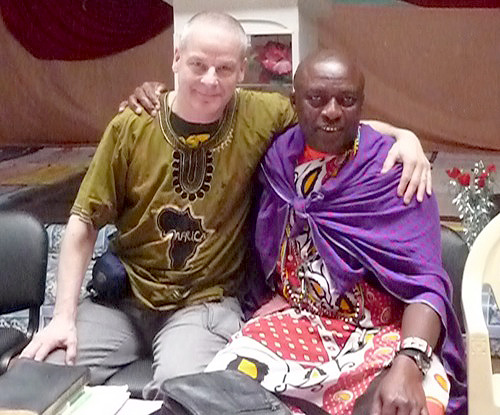APRIL 2025
I have had a very productive time here in Kenya so far. Barnabas Mpekethi, ECLEA-Kenya's national coordinator, and I, began in Misikhu, western Kenya, where I taught the book of Revelation to approximately 30 participants. Our host was my old friend, Bishop Justus Wafula. I originally met Justus in Uganda in 2005 on my first-ever trip to East Africa. It was good to connect with him and his wife Sussy again.
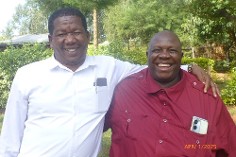
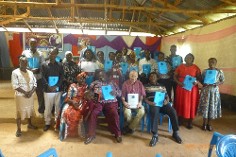
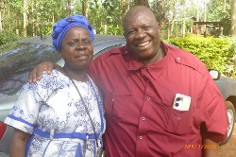
Barnabas and Justus Mishiku group Sussy and Justus Wafula
The course helped to clear up a lot of misconceptions regarding Revelation, especially as we delved into the nature of apocalyptic symbolism. The book deals with issues which are amazingly relevant for the church today. All in all, I think our appreciation for what God is doing to effect his plan was greatly increased.
We then traveled to Eldoret, where we did the book of Galatians for approximately 30 participants. Our host, Samuel Ochieng and his dear wife, treated us to an excellent dinner of fresh tilapia (one of my favorite meals). Galatians gets to the heart of the gospel of God's grace very pointedly, in ways that most other books do not. Our study led to some very practical applications, including some in-depth discussions regarding money management and spiritual gifts. The Word of God can be such a joy to meditate on, discuss, and apply.
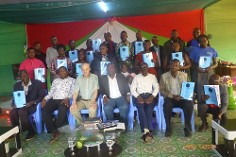
Eldoret group
We are spending the weekend in Karatina, Barnabas's home. I preached on Sunday, and then we left early Monday morning for Isiolo, where we will be considering The Church: Its Nature, Mission, and Purpose.
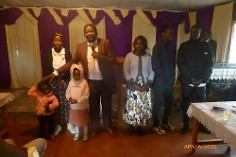
Barnabas and his family in the church
In the second week of the trip, I began in the northern city of Isiolo, where I taught The Church: Its Nature, Mission, and Purpose, to approximately 17 church leaders. This proved to be, I believe, a very powerful and, I hope and think, transformative session. I do not say that lightly.
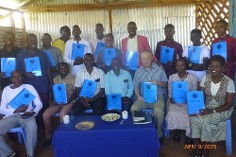
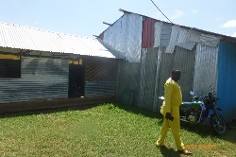
Isiolo group The church in Isiolo
The course focuses on what I see are the four, interrelated basic missions and purposes of the church: worship, discipleship, mission, and unity (wholeness). Of all the church leaders present, none had a personal or family budget, none had a church budget, and only one had the semblance of a formal discipleship program (in which only 15% of his church members were participants).
As we worked through the issues, however, the light dawned. One leader said he had never considered or even heard that the church exists to help meet "real life" problems. By the time we ended, many were agreeing to keep meeting together, strategize, and start working together to help clean up Isiolo, see what other issues they face, find out the problems and resources of their own people, and become the intentional loving and serving body of Christ that God intends them to be.
I think that God spoke clearly and that they are serious about this. If so, it will be amazing to see what happens over the next few years. Please hold them up in tour prayers.
We then went to Nairobi, where I met with ECLEA-Kenya's national coordinator and 12 of our regional coordinators. It had been a long time since I had met with our national leaders, and it was good.
We began by going over how things are proceeding in each of the regions and the challenges we are facing. There was virtually universal agreement that our books and courses are of the highest quality and are having a great impact all across the country. The biggest challenge is financial.
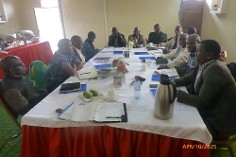
ECLEA-Kenya coordinators
We then went through our book Is Christianity True? The first session and much of the second day concentrated on the so-called "problem of evil" (i.e., if God is good, why is there so much evil?). There are answers to this, and this issue is actually a greater problem for nonbelievers, since if one doesn't believe in God, he or she has no basis for saying that anything is truly, objectively, or universally evil.
We also considered many reasons why we can know that the Bible is reliable and that Jesus is who he says he is, namely, God come to earth as a man. We concluded that now is the time to get this information deeply into us and to teach our people, so that they and we will have the resources we can fall back on when we go through great suffering and evil.
I am so impressed by the commitment of our East African leaders to the ECLEA program. Several of them commented how far they and we have come since ECLEA began.
Thank you for your ongoing prayer and financial support. You make this all possible. I will be home until the end of May, when I am scheduled to go to Tanzania. Here are some pics of the trip.
TOP OF PAGE
JANURARY 2025
I arrived home from Burundi late Sunday evening, Jan 26. As I had suspected, because of poor internet, power outages, and other reasons, I was not able to send you a report from the field. Here it is now.
Before I make my report, let me tell you of Burundi. You may know it it one of the poorest countries in the world. But on top of that, now and for the last few years, Burundi has been facing chronic fuel shortages. (Our driver had to go to Tanzania to refill the car.) Prices have gone up 2-3 times in the last year. The unemployment rate is about 60%. The university has lost half its staff, and many educated people are trying to leave the country. With all that, the country is still beautiful, and all the people I work with and encountered were unfailingly kind. Please pray for these dear souls, their homeland, and the tragic circumstances they face.
This was a very busy, even intense, teaching trip. Francois Nitunga and Patrice Nduwimana of Rema Ministries (our teaching partners in Burundi) interpreted for me in two venues. I taught Biblical Eschatology for 4 1/2 days to about 30 participants in Buhiga (the north central part of the country) and again to about 100 participants for 4 days in Nyanza Lac, next to Lake Tanganyika in the far southwest. Some of the participants had to walk more than 4 hours to attend. Each day we went from about 8:00AM - 3:00PM. In Nyanza Lac we took only two 20 minute breaks. In both venues, the participants had very little good background on eschatology; now they have a solid biblical framework to assess all the major eschatological passages and issues.

Patrice, Francois, and Theo of Rema-Burundi
In Nyanza Lac, I also taught the book of Jonah to about 60 participants for 3 days from 4:00PM - 6:00PM. This book is much more than a "fish story." It actually deals with four of the most important issues we all have to face: the nature and character of God; our relationship with the world and things; our relationship with people who are "different" from us; and our relationship with God.


Nyanza Lac Jonah class Buhiga class
Both eschatology courses began with participants reporting what they had learned and how they had applied the other courses they recently had been taught. There were some amazing reports, including forgiving one's parents, learning to plant fruit trees and vegetables to supplement income, learning to budget, schedule one's time, and more.
In our courses, we began each day with Q&A regarding what we had previously covered. Lots of good questions were asked, often going beyond eschatology itself to the heart of the church and what it should be doing. Those sessions sometimes lasted 2 hours or more and were well worth it. In short, it was a productive, tiring, inspiring time. At night for dinner in Nyanza Lac, we had mukeke, a fish that is unique to Lake Tanganyika, almost every night.

Nyanza Lac eschatology class
Here are some pics. Please pray for the young man and young lady. He was one of the participants in Biblical Eschatology. A fine and intelligent young man. They want to get married, but her father will not give his permission, because he is an albino. I pray that God will soften the father's heart. (Albinos are often mistreated over here.)

My albino friend and his fiancee
I am now scheduled to be in the US until late March, when I will go to Kenya. Thank you for your ongoing prayer and financial support. I hope you can see how much good your support is enabling.
Best regards, and God bless you, Jonathan
TOP OF PAGE
DECEMBER 2024
Jake and Jamie Boldig have returned from the Democratic Republic of the Congo (DRC). It was a great first trip to the country we have dreamed of bringing Equipping Church Leaders East Africa (ECLEA) to for years. We accomplished much of what we came to do despite facing challenges that are to be expected in an exploratory trip such as this in a country suffering from war currently and for most of the past 30 years. We developed relationships with local coordinators, pastors, political leaders, refugee and military camps, potential supporters with resources, and formalized a partnership with Goma Baptist Seminary. (ECLEA works with numerous Protestant denominations).
After an issue with obtaining a Ugandan visa and redirecting our flight, we flew into Kigali, Rwanda to meet with Protais Nshoga, our Rwandan national coordinator, and picked up Stephen Sempala, our Ugandan national coordinator, from a bus stop an hour later. We then drove to a hotel in Gisenyi, a seaside town on the border with the DRC, where we met Pascal Azaza, who is a Congolese missionary to Arusha, Tanzania who has been trained by ECLEA and has an incredible amount of local contacts in Goma, along with his tender hearted wife, Dorcas.

Azarias, Protais, Jake, Sylvester, pascal, Dorcas, Stephen
On our first day in Goma, we met Sylvestre Hangi who has been praying and writing to our Director, Jonathan Menn, for 5 years that ECLEA would be established in DRC. Pascal has been teaching ECLEA courses in DRC with his own resources for over 10 years, and his teaching our Biblical Stewardship course has had a massive impact on Sylvestre, his family, and his community. For example, Sylvestre’s daughter, Sophie, started a business weaving baskets as a result, and his son, Azarias, coordinated our Goma conferences in partnership with Pascal.
We spent two days in our first training center in Mugunga district sharing the vision of ECLEA and teaching the book of Esther for nearly 60 pastors. Jake taught the course with Protais and Pascal assisting in translating. This was a great partnership as they were each able to engage directly in certain discussions and allow a moment for Jake to compose a carefully considered biblical explanation of positions. Much of our time was spent discussing pride. The pastors were hesitant to accept that pastors face the risk of pride, but we were able to provide countless biblical examples of heroes of the faith who fell into great sin as a result of pride. Some of the pastors were astonished to learn that the Pharisees could be priests and yet not truly have faith. At the same time, we made the case that we ought to primarily consider our own temptation to pride and need for strengthened faith. We shared the wisdom of 1 John and 1 Peter along with Jesus’ declaration that we are not the final judges; hence, we argued that we ought to graciously give our brothers and sisters the benefit of the doubt when it comes to the validity of their faith.

Mugunga class
We can see God’s sovereign hand in the process of selecting this group to accompany us. Each member brings a significant unique addition. Stephen has invaluable experience in planting ECLEA in Rwanda. Protais has an amazingly relevant testimony of forgiving the particular men face to face who slaughtered his mother and countless family members during the 1994 genocide and leading a reconciliation effort in Rwanda for over 20 years. This is powerful because the region we are in has experienced incredible amounts of rebel warfare against civilians ever since that genocide, and there has been another large flare up in the past couple years. Pascal and Dorcas are important because they are typically boisterous Congolese – I cannot imagine being able to connect with and hold the attention of such a lively culture without their assistance. In addition, they have done extensive work in the refugee camps in the past decade which gives us direct access to the most vulnerable widows and orphans in the region.
After class the second day, we were able to visit an orphanage that one of Pascal’s contacts, Noella, operates in Bulengo refugee camp, which ‘houses’ over 100,000 (mostly Christian) Congolese in tents. They have been displaced by rebel warfare in their villages and the eruption of Mt Nyiragongo two years ago. Each member of our team was able to speak to hundreds of them with a microphone delivering a message of hope, reminding them that Christ chose to become a refugee in this world to save them and that all things happen to bring us closer to Him. We received generous donations from friends and church members at home of nearly $1,500, so were able to purchase a significant amount of food to feed the orphans who lined up patiently in a sea of children raising bowls celebrating the blessing while we spoke glorifying God. We spread this money out to three orphanages and one church neighboring a refugee camp. We did not discuss this with our training centers to prevent creating the distracting image that ECLEA is a humanitarian aid organization.

Orphanage
The second center we visited was in Majengo district. We had a smaller group of about 20 pastors there and we presented the vision of ECLEA briefly before Stephen and Protais taught the book of Jonah. There was great interest here in the nuance of how God often uses our sinful actions to orchestrate His plan and yet we are fully responsible for our actions. I recall a question about whether it would be ok to accept money from a non-Christian to help build their church. We applied 1 Corinthians 8 where Paul discusses eating meat sacrificed to fake gods to point out that a situation like this would be a matter of conscience and not causing your members to stumble into sin necessitating difficult conversations and prayerful consideration.

Majengo class
After class on the first day in Majengo center, we met with one of the four Members of Parliament from Goma to establish a relationship with the local government, which is important in a country where there is a lot of red tape and a security situation that we need to always be aware of. This MP is visiting Appleton in May, so we are excited to continue the relationship. After class the second day, we met with the Bishop Athanase who heads the Goma Baptist Seminary and formed a developing partnership where they will use our training materials and seek to use their extensive resources (including a first-rate print shop, recording studio, and translation experience) to expand our reach within DRC. His daughter, Happiness, manages a large orphanage that they run, which we also visited. We delivered a message to the kids that like Joseph, God has a good (and yet difficult) plan for our lives, but we must make wise decisions for the future and work hard each day.
On Saturday, we taught a one day course at the military camp in Katindo district for about 30 pastors. Our Rwandan member of the team, Protais, was advised not to attend due to tensions between DRC and Rwanda. He agreed but politics was unfortunately a stumbling block at this center. These pastors who are soldiers have fresh wounds in their hearts from this war. We were able to give what I felt was our most thorough vision casting explaining the types of books that we have created and how pastors can use them to improve their churches and sermons. Stephen taught an abbreviated course on the book of Ruth here, but politics became a distraction after a couple hours and the discussion got pretty heated towards the end of the class. Stephen offered to repent on behalf of our countries’ sins. This unexpectedly escalated tensions until one pastor declared that “clearly it was a work of the Holy Spirit if a Ugandan would repent on behalf of his country, because I have never heard of that.” This started to soften some hearts and then Pascal was able to lead the pastors to all pray with us after preaching a short message. This prayer time was powerful and seemed to soften more than a few hearts.


Goma MP Katindo class
On Sunday, Jake and Jamie were able to visit a small church amongst a refugee camp to feed well over a hundred children. It was a special time where we shared a message with the kids about loving our enemy since all of us were made in the image of God. We also shared about the importance of being good stewards of resources. Then we made a small presentation about ECLEA to Bishop Athanase’s large church before Protais delivered a powerful sermon on forgiveness and reconciliation focusing on the story of Joseph forgiving his brothers. Following the sermon, we were guests of honor at the seminary’s graduation ceremony, even leading the march through town with an accompanying band. We ended our last night in Goma with an evening at Bishop Athanase’s house to thank him for his official invitation and lending us a vehicle and his son as a driver for the week and briefly discussing a bit more about the potential for our partnership.


Bishop Athanase's church Goma Baptist Seminary Graduation
We had a lovely journey through Rwanda down to Bukavu on Monday and crossed the border and had a day of preparation on Tuesday after arriving. This time was a blessing for obtaining rest and doing some reflection as a group. On Wednesday, we began to present the vision of ECLEA. This center was assembled very recently, and this area truly represented an exploratory venture into an area we did not have firm roots in. The security situation in this area is much better though so we were freer to move about and learn. Bishop Samuel welcomed us to the area and assembled church leaders from the district and his church. We found it necessary to reiterate that our purpose is simply to teach pastors. We encountered some challenges such as a desire for a humanitarian partner and a misconception that we focus on training one church and all its leaders at one time. It was a great learning experience to be very clear and repeat ourselves many times (when accepting an initial invitation from a budding center) – to share that we aim to teach pastors from different churches and denominations in each center and are not a humanitarian aid organization.


Bukavu--Jamie and kids Bukavu class
Protais taught our course on Forgiveness and Reconciliation in the afternoon Wednesday and on Thursday for about 30 pastors. He was able to use his testimony and visual demonstrations of how unforgiveness is a bitter root that works to destroy our physical and spiritual lives. He is the best person to teach this course anywhere, but his message is even more convicting in DRC during the current war as a Rwandan who miraculously survived the 1994 genocide and forgave (face to face) the men who took the life of many of his family members. There were many questions about how the church ought to go about forgiving leaders and members who sin publicly. We were able to briefly teach about the process of church discipline that Paul laid out for us and explain its purposes of protecting the church body and winning back unrepentant sinners. There was a deep hunger to have us back. We were also able to meet with the governors’ secretary and establish some relationships with other potential ECLEA leaders in South Kivu.

Protais teaching, with Pascal and Sylvester
After training Thursday, we crossed the border and returned to Rwanda. We used parts of the long journey to Kigali to reflect on our efforts and discoveries on this trip. Then we spent a couple days with Protais in Kigali relaxing and learning about the history of Rwanda, the genocide, and the history of the ongoing conflict in the DRC. Finally, we flew home. Our return flight included an 8 hour stay in Addis Ababa, Ethiopia where Ethiopian Airlines gave us a free hotel room and we enjoyed our favorite cuisine in its home country. The entire trip was a generous gift from God blessing us with time with the beautiful cultures that we love.
We now look forward to a year of planning the slow expansion of ECLEA within the Kivu region of DRC. We will send at least one ECLEA teacher each month to visit our existing centers and plant new ones. The Boldigs anticipate making another trip to the DRC within a year. If you would like to help us train pastors with monthly support, you can set that up with the donate link below! (All donations are used to translate training materials and host classes in East Africa). We praise God for this trip and thank you for your prayers and support!
In Christ,
Jake & Jamie Boldig
TOP OF PAGE
ECLEA 2024 YEAR-END REPORT
2024 has been another productive and effective year for ECLEA. Our friend and missionary teacher, Frank Cummings, decided to retire from active ministry in East Africa. Further, because of various church-related issues and involvement, our fellow teachers in Virginia, Robert and Sondra Adams, are similarly stepping back from travel to East Africa. All of these good people will be missed. Nevertheless, our work—both from the American side and indigenously by the East Africans—has continued unabated. New ECLEA books and translations have been completed, and ECLEA has extended its relationships with East African colleges and theological schools. Here are some of the year’s highlights:
Jonathan’s work in East Africa
I was again able to make five trips to East Africa. In January-February, I was in Rwanda, where I taught Biblical interpretation (3X). In April, I was in Kenya and did Biblical Interpretation, Stewardship of Time (to a large women’s conference), Esther, Forgiveness & Reconciliation, and Biblical Interpreation. In June, I was in Tanzania and taught 1 Peter, Ruth, Jonah, and Habakkuk. In May-June, I went to Burundi, where I taught The Church: Its Nature, Mission, and Purpose and Jonah. I also participated in 4 graduation ceremonies with a total of 158 graduates, who completed their 31/2-year program of study (utilizing ECLEA course books). In September I was in Tanzania where I met with 20 of the main Tanzanian ECLEA teachers and talked about ECLEEA’s vision, mission, purpose, and teaching methodologies. I also taught at three venues the books of Esther, Ephesians, and Biblical Interpretation. Finally, in October, I was in Uganda where I taught Biblical Interpretation.
I also participated in a graduation ceremony for 30 students, respectively, who received certificates, diplomas, and degrees from East Africa Polytechnic College Kyambogo (the theological school which has partnered with ECLEA in Uganda). Further, I accompanied Bishop Sempala and the group from his secondary school, Prince Joseph Academy, to the Julius Nyerere/East Africa Community 25-year commemoration ceremony. In total, I taught well over 350 students. In short, a wonderful and productive year where the gospel is being taught broadly and deeply throughout East Africa! You can see my reports on the ECLEA News & Blog page of the ECLEA website. (http://www.eclea.net/news.html).
Paul and Rosemary Nelsen’s work in East Africa
Paul and Rosemary Nelsen were hosted for about a week in Tanzania by Equipping Church Leaders Executive Director Joram Ibrahim the last part of January, 2024. The trip was so both could present courses they had written as part of the ECLEA curriculum. Rosemary taught her three Bible Literacy Courses (Two Old Testament and One New Testament) using visual aids, participation, and lecture. Paul taught a new course on leadership based on Nehemiah, chapters 1-6. These courses were taught in Arusha and Tanga.
The highlight of their visit was a graduation ceremony that took place in Tanga on Saturday, Jan. 27. Almost 40 students were given a certificate of completion for a two-year courses covering ECLEA curriculum. The Nelsens participated by shaking hands with each student and presenting the certificate.
Jacob Boldig’s work in East Africa
Jake absorbed the role of bookkeeper in 2024 after Brenda Haase retired. He spent time creating tools to analyze donations and expenses to better summarize our activities at a high level.
Jake and his wife, Jamie, will be traveling to the Democratic Republic of the Congo with Stephen Sempala and Protais Nshogoza for two weeks in December 2024. This trip will consist of visiting three centers in Goma and one in Bukavu in Eastern DRC that have been started by Congolese pastors who have been reached by many previous self-funded trips of ECLEA trainers from the neighboring five countries that we have a footprint in. We will spend two days at each center presenting the vision of ECLEA and teaching. Stephen, Protais, and Jake will remain in contact with DRC leaders over the next year to monitor results. Stephen is also expecting to make monthly trips to DRC in 2025 to more closely advise DRC leaders. We have long identified the Eastern DRC as a major opportunity for expansion, so we are excited to make our first trip there.
All-African ECLEA training conferences
ECLEA’s name reflects what we stand for: we equip church leaders of East Africa so they can equip others. As a result, the vast majority of ECLEA’s work is done by the East Africa church leaders themselves! In 2024 our East African ECLEA teams kept moving forward, teaching at the different centers they established:
* Burundi: Rema Ministries (ECLEA’s teaching partner in Burundi) have done over 50 training sessions in the 7 training centers they have established around the country.
* Kenya: Kenya’s regional coordinators led approximately 100 ECLEA conferences.
* Rwanda: Under national coordinator Protais Nshogoza, our Rwandan ECLEA teams did approximately 50 all-African training conferences this year.
* Tanzania: Joram Ibrahim, ECLEA-Tanzania’s national coordinator, and the ECLEA-Tanzania team have led over 50 conferences.
* Uganda: Under Bishop Stephen Sempala’s leadership, over 300 all-African teaching conferences and follow-ups were conducted around the country.
Reports from the all-African training conferences are available on the individual country pages of the ECLEA website (www.eclea.net).
The Impact of ECLEA
ECLEA’s mission is: “Deep Foundations=>Healthy Churches=>Transformed Lives.” Here are some comments from East Africans I have received concerning the impact ECLEA is having:
* Barnabas Chihekwe (Tanzania): Frankly speaking you are doing great work of outsourcing and spotlighting best educative Christian spiritual balanced diet to us (East African Church Leaders).
* Bishop Julius Ceaser Nina Otim (Uganda): The ECLEA program is one of effective factors which has played huge Evangelical role to firstly equipped many different Pastors and Church Leadership with excellent theological materials for transportation of the community in East Africa. Through ECLEA training program most of the Pastors of different Denominations were able to come together regardless of their religious affiliations. The ECLEA materials is credible enough to enable a theological student perform very well in theological studies. Therefore, I want to thank God for you and the supporters of the ECLEA program, may the Grace and blessings of God Almighty be with you always.
* Paul Batambuze Wamuka (Uganda): Thank you for the great work you're doing to promote God's work especially among the very poor community church members in rural areas. Your Biblical training approach is unique, down to earth even to the least at the grassroot is timely. God bless you abundantly.
* Patrice Nduwimana (Burundi): I really appreciate the work that you are doing. to prepare tools for church Leaders. Pastors who went through ECCLEA books are really making a difference in their local churches. If you look at the way they lead people, the way they teach and preach, the way they organize things is really different from the way they used to.
Other ECLEA happenings
In addition to our multiple church leader training conferences all over East Africa, ECLEA has a number of other projects to increase our lasting impact and effectiveness. These include:
* ECLEA books and video lectures: In 2024 our ECLEA book on apologetics, Is Christianity True?, and the accompanying set of video lectures, was finalized. I am happy to say that Is Christianity True? was published at the beginning of November by Resource Publications (an imprint of Wipf and Stock Publishers of Eugene, OR). It includes a foreword by R. Fowler White, PhD and has been endorsed by Josh McDowell, Michael Newnham (the “Phoenix Preacher”), and OT professor Dr. Ingrid Faro (Northern Seminary). It has already been hailed as the “new standard” for conservative, evangelical apologetics (https://www.phoenixpreacher.com/is-christianity-true/). It is available in paperback, hardback, and a Kindle edition through Amazon.com and other online booksellers.
* ECLEA book translations: Translating our books into the major East African languages is a hugely important part of what ECLEA does, since few other good theological resources are available in the indigenous African languages. These books will continue to have an impact for generations.
Translations of several of our books also were completed in 2024. These include the KINYARWANDA translation of Galatians, the KISWAHILI translation of Esther, the LUGANDA translations of Biblical Eschatology, Christianity and Islam: The Essentials, and Esther, and the RUNYANKORE translations of 1 Timothy, Biblical Stewardship, Biblical Literacy, Forgiveness & Reconciliation, and Is Christianity True?
All of our books, translations, and video lectures are on the “ECLEA Courses & Resources” page of the website: http://www.eclea.net/courses.html. The video lectures (as well as videos of other matters pertaining to East Africa and ECLEA’s work) also are on the ECLEA YouTube video channel: https://www.youtube.com/channel/UCpN8YUjt8zpi9iKfcuozxJw.
* School partnerships: Our ECLEA teaching books provide some of the most in-depth teaching available. One of our goals is to establish partnerships or agreements with existing East African theological schools whereby our materials become part of the schools’ curriculum. ECLEA now has relationships with Lawrence Bible University in Rwanda, Bishop Kiguru Bible College in Tanzania (that endeavor is called the East Africa Theological Bible Institute-TZ), Nairobi Pentecostal Bible College in Kenya, and East Africa Polytechnic College Kyambogo in Uganda. There are also other, smaller schools who have adopted and utilized our curriculum around East Africa. We want to see this network of schools expand, since through them our influence will continue to be felt for generations.
* Bishop Sempala’s visit: Bishop Stephen Sempala of Uganda visited the USA earlier this year. He spent a week in Appleton, met with a number of ECLEA supporters, spoke at two churches, and even met with the president of the Wisconsin Timber Rattlers baseball team about starting a baseball academy in Uganda! He is a forward-thinking man, and we are honored to have him as part of ECLEA.
* Nepal: Although Nepal is on the other side of the world, far from East Africa, ECLEA’s materials are being used even there. Earlier this year I was contacted by Roshan Adhikari, the founder and president of Alpha Bible College & Seminary in Kathmandu, Nepal. As a result of our material, he asked me to teach (via Zoom) a class of his students on Biblical Interpretation, which I did during the first half of the year. I will now be teaching two courses on Biblical Interpretation, from now until April.
* Expansion: I have always gone to Burundi, Kenya, Rwanda, Tanzania, and Uganda. However, the East Africa Community has been officially expanded to now include Democratic Republic of Congo, Somalia, and South Sudan. We have on several occasions been asked to teach outside of the five countries I go to. This December, Jake and Jamie Boldig, accompanied by Bishop Sempala and Protais Nshogoza, will be going to DRC to teach and establish an ECLEA organization there. Additionally, when I was in Kenya, I met with pastor David Njeru, our ECLEA-Kenya Nairobi coordinator, who would very much like to head ECLEA operations in places like Ethiopia, Malawi, and other African nations. We are very open to this. Our biggest hold-ups are obtaining the necessary funds and personnel.
Looking ahead
By God’s grace we will continue moving forward in all areas in 2025. We take seriously Christ’s commission to go “to the ends of the earth” (Acts 1:8). Few others are doing what we are doing—none is doing church leader training and preparing and translating excellent books that go to the heart of what Christians and church leaders need on the scale we are doing it.
You can make a difference
* Giving opportunities: 100% of donations goes to the work of the ministry. Donations are tax-deductible to the fullest extent allowed by law. Your financial support is necessary (it enables us to go “to the ends of the earth,” translate our books into the indigenous languages, and also helps facilitate the all-African training conferences). It is paying great dividends (as I hope you see from the above report).
Tax-deductible giving can be done through the website (http://www.eclea.net/contact.html), automatic fund transfers can be arranged through your bank, or checks (payable to ECLEA) can be sent to the ECLEA office at 714 S. Summit St., Appleton, WI 54914.
* To contact ECLEA's treasurer: If you wish to contact Jacob Boldig, ECLEA’s treasurer, his number is 920-209-1477 and his email address is jacobboldig@gmail.com.
* We value your input and suggestions: Let us know what you think! If you no longer wish to receive these updates, please let us know, and I will be happy to remove you from the mailing list.
We wish you a joyous Christmas and a Happy New Year!
Thank you and God bless you,
Jonathan Menn (ECLEA, Inc. President)
TOP OF PAGE
Jonathan Menn-ECLEA Director

Oct 2024: Uganda and Tanzania
I am currently in Mukono, having just completed out first teaching session in Ngora, where we did Biblical Interpretation with about 40 participants. Ngora is the home of my old friend Martin Odi. I had met Martin years ago when I was with EPI but had not seen him since then. Martin was the host of the teaching, and when we got together, it was like we had never been apart--the same banter, the same camaraderie, etc. (we both must still have the same writers!). It was great to renew an old friendship.
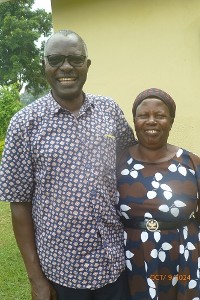
Martin and Helen Odi
The teaching itself went well. We covered the important hermeneutical principles one needs to know in order to interpret and understand the Bible well. We then covered multiple passages of Scripture in light of their genre, structure, and, most importantly, their context (both the immediate and broader literary context and the historical and cultural context). As one participant told Bishop Stephen Sempala, "This has been an eye-opener, to see what the Bible really means in its context." All in all, a very worthwhile meeting.
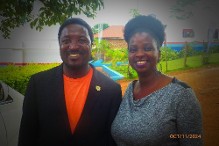
Stephen and Violet Sempala
Another interesting personal event occurred. Twenty-three years ago, Bishop Sempala's cousin married a man, but Stephen was not at the wedding, because he was out of the country. In fact, he had never met his cousin's husband. It turns out that the husband, Andrew Okalebo, was the manager of the hotel Stephen and I were staying at in Ngora, and also was friends with Martin Odi! He is a very accomplished person, and it was nice to have dinner with him one evening.

Andrew Okalebo and Stephen
There has been a change in my itinerary. I was going to be going to Bavuma Island next, to teach the book of Ruth. However, in addition to being the bishop overseeing the Evangelical and Pentecostals of Mukono Distict, Bishop Sempala is also the head of Prince Joseph Academy, a highly regarded secondary school. There is going to be a commemoration ceremony in Tanzania, commemorating the late Julius Nyerere (first president of Tanzania) and the 25th anniversary of the founding of the East Africa Community. Stephen is leading a delegation from Prince Joseph Academy to the commemoration. PJA is the only Ugandan school invited to take part, and Stephen has invited me to also attend. So we will begin the journey to Tanzania tomorrow night. I am honored to be going.

Prince Joseph Academy
The bus trip to Butiama, TZ was only about 350 miles but took 25.5 hours. We spent 5 hours at the Kenya-Tanzania border where, I was told, certain alleged "fees" had, as if by magic, gone up. When we arrived (2:30AM) we walked about a mile to our quarters. My room, one might say, was rather spartan (no shower or running water--see photos).


My room in Butiama Bathroom
We were staying in Butiama, where Nyerere was from and saw a museum dedicated to him, where he was born, and his grave. At the main program, the students of Prince Joseph Academy performed a wonderful poem which they had written and choreographed themselves. There were also some good speeches.

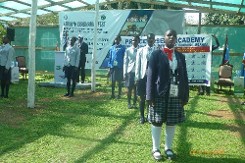
Commemoration ceremony PJA students performing
However, the kicker was that, the organizers in Kampala had chartered a plane to fly some big people to the event. They did not hire busses to take them back to the airport in Mwanza. Consequently, the airplane people took our two busses to go back to Mwanza (a 4 hour trip each way). Hence, we all spent the night in Butiama. BUT, no provision had been made for us to spend an extra night, so there was no place to sleep and nothing to eat. The manager of the place where we had been congregating was kind enough to lay out a couple of mattresses for some of the students to sleep on. As to rest of us, someone made a campfire (it gets cool at night), and about 20 of us spent the night around the campfire! People took a collection, and we had some tea, bread, mandazi (like African donuts), and porridge in the morning. Someone had a small speaker which played music from her phone, a few people danced, an old man told some funny stories, and it ended up being a once-in-a-lifetime night. The busses returned in the early morning, and we made it back to Kampala.
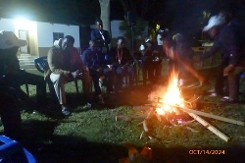
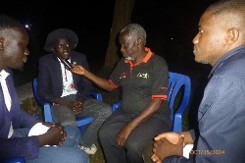
Around the campfire Old man telling funny stories
Because of the extra day in Tanzania, I only ended up having one day in Mbiriizi (Masaka region) to teach on Christianity and Islam. Nevertheless, I think it went well: I focused on Jesus in the Quran and making the Trinity understandable, as well as a couple of other things. On Friday, there was a graduation ceremony for 30 people who had spent 2 years going through our ECLEA courses. It was a great ceremony. There was a band; the band and graduates marched through the town; and the mayor spoke. It really showed me (again) how important ECLEA is and what a difference ECLEA is making in the lives of thousands of church leaders, other people, and churches throughout East Africa. This is very humbling to me--and ultimately, all of this is because of your faithful support.
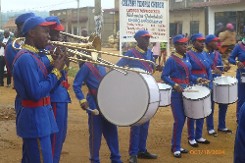

The band at the graduation The graduates
TOP OF PAGE

